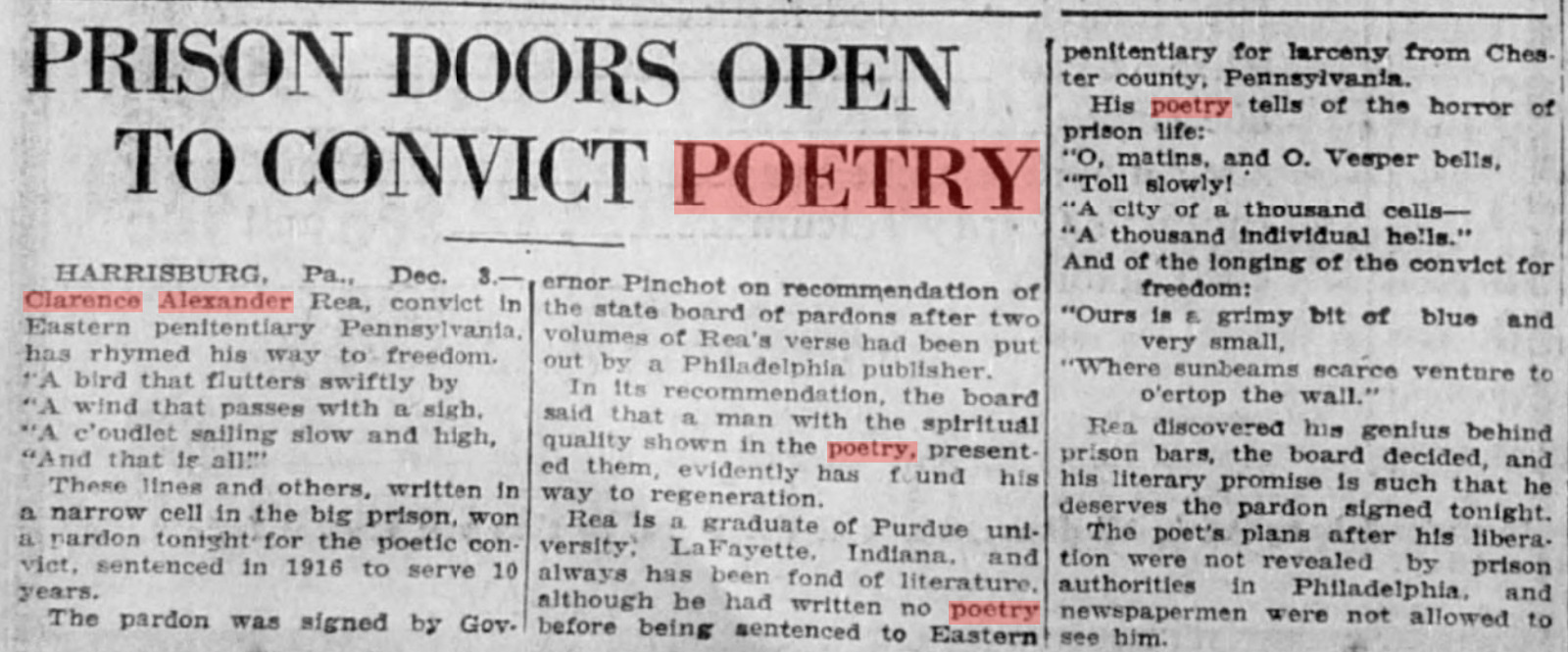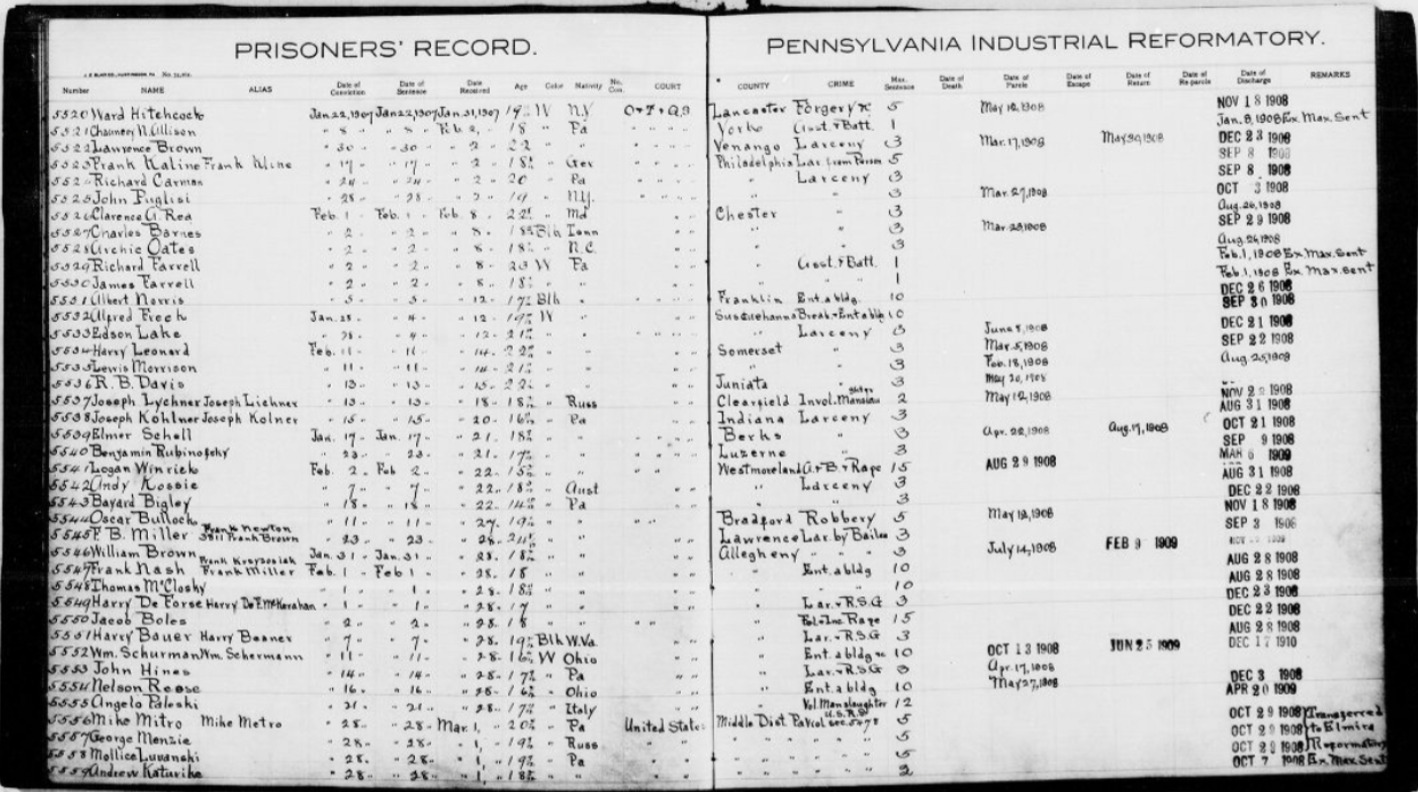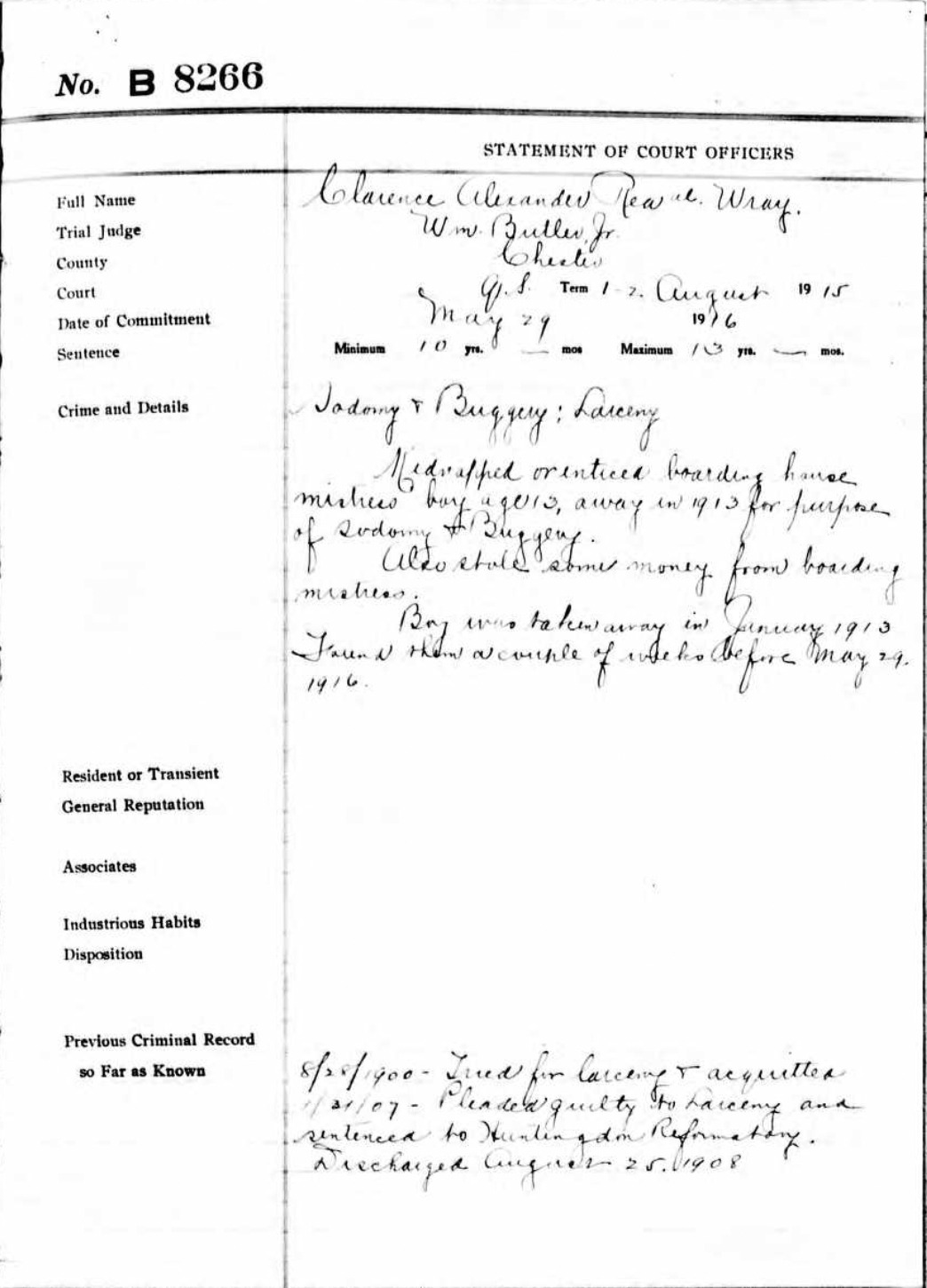Established 2023
A Tale of a Walled Town
Sunday, November 10, 2024
Nick P
A Tale of a Walled Town by Clarence Alexander Rea
Ours is a grimy bit of blue;
And very small;
And sunbeams scarce adventure to
O'ertop the wall.
A bird that flutters swiftly by;
A wind that passes with a sigh;
A cloudlet sailing slow and high;
And that is all.
O matins, and O vesper bells,
Toll slowly!
A city of a thousand cells—
A thousand individual hells.
Their walls of stone and bars of steel,
So cold to see and cold to feel,
They make the warmest heart congeal,
Like to the wall.
And therein walk the living dead,
Their hands so deeply dyed in red,
That even hope from them has fled,
Beyond recall.
And when the midnight wraps it round,
Toll slowly!
Extract taken from Prologue of A Tale of a Walled Town
Wrote Clarence Alexander Rea of the Eastern State Penitentiary. Trapped within the walled town, incarcerated person B8266, as he was known as by readers of The Umpire, rose through the ranks to become a leader within the community. First a scribe for the prison’s Honor and Friendship Club whose updates had to be approved by its vice president, he eventually was elected secretary of the club – a club which created entertainment for those in the prison from comedic and music performances to informal baseball games, perhaps a respite from the gruelling solitary nature of life in the prison. He later became editor of The Umpire itself and the main contributor of news articles to the newspaper. However, he was also known for the poems he would often pen in the paper. Such was his talent that a book of his works edited by William Stanley Braithwaite containing the poem read throughout this piece was published while he was still imprisoned in 1921.
No course of true love e'er runs smooth;
Toll slowly!
'Tis but the false is shorn of ruth:
An old wive's tale that cannot soothe.
They laughed my lover's plea to scorn;
They said that I was basely born;
That " blood will out "—on some far morn,
Woe would befall.
I might not look upon her face;
I might no tender message trace;
I might not enter in that place
That held my all.
Think you I was content with this?
Toll slowly!
When I had tasted, forego bliss,
Remembering that one first kiss?
I sought my love through all the day;
I sought her in each 'customed way;
I found her in the evening's gray,
Where lindens tall
Dropt creamy blossoms down the swale;
And told her all my lover's tale;
And waited then her verdict, pale,
And trembling all.
Her answer was that I had guessed;
Toll slowly!
She laid her head upon my breast-
And that kiss I remember best!
Extract taken from Canto 5 of A Tale of a Walled Town
The poem tells of a man whose pursuit of love led him down the wrong path. A man whose youthful love found a woman whom he proceeded to marry. However, as his love for her grew, so did her desire for luxury, as did the pressure on him to provide for a lifestyle he couldn’t afford himself.
I clothed a butterfly in grey,
And thought to tame it to my way,
Who had not learned to dance and play.
Toll slowly!
Nor cared for any vain parade
Of fools in peacock plumes arrayed;
Or any mimic art displayed:
She loved them all.
I read the longing in her eyes,
And in the night I heard her sighs,
And vowed to give her that she'd prize,
Whate'er befall.
I rose up from my loved one's side
Toll slowly!
One midnight; e'er the cock had cried,
I'd spoiled me that rich countryside.
That day I gave her minted gold;
And jewels—all her hands might hold—
And gorgeous stuffs, and laces old,
For her delight.
She asked not whence, or how they came;
She but consumed them as a flame,
And heaped caresses, till the shame
Had taken flight.
That soul remembering too well,
Toll slowly!
The sunward height from whence it fell,
Is salted with all fires of hell.
They took me: on a summer's morn,
They took me, bound me, I was borne;
Chivied, raged at, 'whelmed with scorn,
To tribunal.
O smug judge, voicing your regret,
I had incurred too heavy debt
For mercy; was it then well met
With seven years?
There are no Daniels left to-day;
Toll slowly!
But cold machines, who spare or slay,
According as the statutes say.
Extract taken from Canto 7 of A Tale of a Walled Town
All the pressure and desperation gnawed at him, and he eventually gave in. He found himself entangled in a web of theft to satisfy her material needs. It was not long before he was caught and apprehended to seven years in prison. However, upon his release, having just lost out on the prime of his youth, he came back to see the same woman now wedded to a man richer than him – a tragedy which led him to commit the crime for which he was now supposedly incarcerated. You can only help but feel a deep sense of sympathy for a man deprived of his youth by the same woman who had betrayed him.
I would have known then that they cared,
And all my soul to them had bared.
Still doth the ancient law, forsooth,
Claim eye for eye, and tooth for tooth ;
They took full measure of my youth
For seven years.
They came and told me I was free,
To go the where it pleased me;
I hasted that loved face to see
I held most dear.
One met me bleak-eyed at the door,
Toll slowly!
And in three words, or haply four,
Had blasted dreams for evermore.
I sought her where she lay asleep:
Within God's acre the winds keep
Their vigil, and the dun clouds weep,
As though they'd blot
Out memory of that hath been
For one, yet keep another's green.
God grant all sleepers do not dream
Of bygone lot!
There was a man—a rich man's son—
Toll slowly!
Had coveted that I had won,
And for her feet a web had spun.
I faced him of a winter's night,
When all the world about was white,
As was his face in the firelight,
Looking on me.
When doom comes with stern, Minos face,
Some rise and hail it, in their place,
And some they grovel on their face;
And thus did he.
For such as he there was no prayer;
Toll slowly!
I struck; and when I left him there,
His blood had crimsoned all his hair.
Here in this cell they coffined me;
Toll slowly!
Extract taken from Canto 8 of A Tale of a Walled Town
Perhaps, it is worth viewing Clarence Alexander Rea not as an incarcerated person but an artist whose circumstances had turned into an incarcerated person whose dreams and imaginations still roam free, exploring the world outside the walled town. Not only did he find solace in reading the latest literary magazines, staying updated by reading the latest issue of Literary Digest, but he was also an admirer of the classical greats in Ovid and Aristophanes by whom his writing was greatly influenced.
O better far that death should be
Of every crime the penalty,
Than such creation should go free
At any time.
Sly devils clothed in human flesh;
Toll slowly!
Whose revellings in midnight's hush
Might make Abaddon's self to blush.
Upon a wheel of solitude They bind them of defiant mood, And break them; and they call it good, That fear doth fall
Upon them; and no more again,
They stand among their fellow-men,
Straight-kneed, and level-eyed, as when
They passed the wall.
What agency of theirs can make
Toll slowly!
Anew that thing they idly break
Upon a wheel for order's sake?
May God forgive them the mistake!
O would that it were but a dream,
Bred of the night!
To waken in the morning gleam,
And see the light
On faces that we loved and knew;
To hear a lark sing in the blue,
Or bustle of the avenue—
God, and we might!
Extract taken from Epilogue of A Tale of a Walled Town
Indeed, for his great poetry, he was eventually freed from the penitentiary on December 3rd, 1923. Sentenced to 10 years in prison, his stay was cut short by 3 years, as he was seen to have shown his ‘spiritual quality’ through his writings – the state board of pardons recommended his release following the publishing of two volumes of his verse, including a Tale of a Walled Town. After all, the Eastern State Penitentiary was founded on a model replicated globally that believed that incarcerated persons should be locked in, not for punishment, but to encourage penitence – through his writings, Clarence Alexander Rea had proved that he was no longer his old self.

Article in the Casper Daily Tribune detailing his release from Eastern State Penitentiary.
Or was he? Clarence Alexander Rea’s prison records suggest that he was incarcerated for enticing a boarding house mistress away for sodomy and buggery, then stealing money from her. Indeed, his criminal records suggest his previous convictions were for larceny that matched not what was penned in his poem but something completely different. He was sentenced to a year at the Huntingdon Reformatory whose own records corroborate this information. Was everything experienced in a Tale of a Walled Town simply in his dreams and imaginations? Perhaps a creative dissonance?

Clarence Alexander Rea’s prisoner record at Huntingdon Reformatory where he was imprisoned for larceny for a year prior to his stay at Eastern State Penitentiary.

Clarence Alexander Rea’s court records prior to his imprisonment at Eastern State Penitentiary.
Bibliography:
Pennsylvania Historical and Museum Commission. “Pennsylvania, U.S., Prison, Reformatory, and Workhouse Records, 1829-1971.” Ancestry.com, 2016. Accessed October 28, 2024. https://www.ancestrylibrary.com/discoveryui-content/view/76861:61173?tid=&pid=&queryid=33d15f22-1c76-4f10-b593-3fb5f3f07307&_phsrc=xFt1&_phstart=successSource.
Pennsylvania Industrial Reformatory (Huntingdon, Pa.). “Pennsylvania Industrial Reformatory: Prisoners’ Record 1889-1929 (Roll 6652).” Power Library. Accessed October 28, 2024. https://digitalarchives.powerlibrary.org/psa/islandora/object/psa%3A410196.
Casper Daily Tribune. “Prison Doors Open to Convict Poetry,” December 3, 1923. https://chroniclingamerica.loc.gov/lccn/sn86072160/1923-12-03/ed-1/seq-6/.
Rae, Clarence Alexander. A Tale of a Walled Town: And Other Verses. Edited by William Stanley Braithwaite. J. B. Lippincott Company, 1921.
